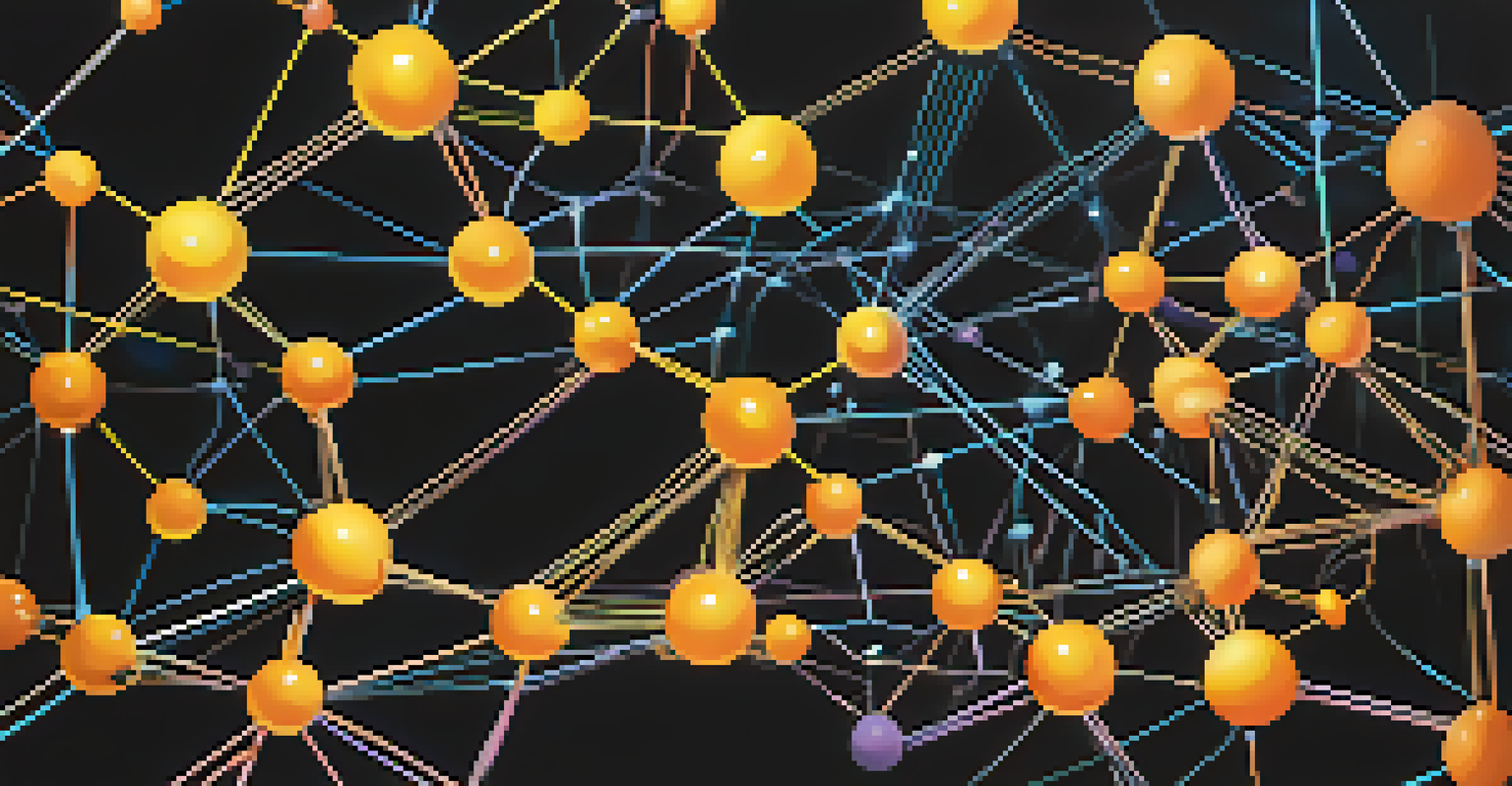How Decentralized Oracles Enable Real-World Data Access

Understanding Decentralized Oracles and Their Importance
Decentralized oracles are crucial in the blockchain ecosystem, acting as bridges between smart contracts and real-world data. Unlike centralized oracles, which rely on a single source, decentralized oracles aggregate information from multiple sources, ensuring accuracy and reliability. This decentralized approach mitigates risks of manipulation and enhances the trustworthiness of data fed into blockchain applications.
In a world where data is the new oil, decentralized oracles are the pipelines that transport it to where it’s needed most.
For instance, think of decentralized oracles like a group of friends gathering information about a restaurant. Instead of relying on one review, they compile opinions from various sources, ensuring a well-rounded understanding. This collective intelligence allows decentralized oracles to provide more accurate and trustworthy data, which is essential for applications that depend on real-time information.
As the demand for blockchain technology grows across industries, the role of decentralized oracles becomes increasingly vital. They enable smart contracts to interact with external data, making it possible for these contracts to execute based on real-world events, such as stock prices, weather conditions, or sports scores.
How Decentralized Oracles Work
Decentralized oracles function by gathering data from multiple sources and then delivering it to smart contracts on the blockchain. This process typically involves several steps, including data sourcing, validation, and delivery, ensuring that the information is accurate and reliable. By using consensus mechanisms, decentralized oracles can determine which data points are most trustworthy, further enhancing their reliability.

Imagine a voting process where each oracle acts as a voter, casting their 'vote' on the validity of the data. The outcome is determined by the majority, which helps filter out any potentially false or misleading information. This democratic approach to data collection plays a crucial role in maintaining the integrity of the information used in blockchain applications.
Decentralized Oracles Ensure Data Accuracy
By aggregating information from multiple sources, decentralized oracles enhance the trustworthiness of data used in blockchain applications.
Moreover, the use of blockchain technology in decentralized oracles means that all data transactions are transparent and traceable. This transparency fosters trust among users and developers, encouraging more widespread adoption of blockchain solutions across various sectors.
Real-World Applications of Decentralized Oracles
Decentralized oracles have numerous real-world applications that showcase their potential. One notable example is in the field of finance, where they can provide real-time price feeds for cryptocurrencies and traditional assets. This data is crucial for decentralized finance (DeFi) platforms that rely on accurate pricing to facilitate transactions and loans.
The future is already here — it's just not very evenly distributed.
Another area where decentralized oracles shine is in supply chain management. By providing real-time data about the status of goods, such as temperature or location, these oracles help ensure that products are delivered in optimal conditions. This data is vital for industries like pharmaceuticals, where maintaining specific conditions is critical for product integrity.
Additionally, decentralized oracles can enhance gaming and sports betting platforms by providing real-time scores and statistics. This capability allows for dynamic betting options and ensures that players have access to the latest information, which is essential for making informed decisions.
Challenges Faced by Decentralized Oracles
Despite their advantages, decentralized oracles face several challenges that need to be addressed for broader adoption. One significant issue is the potential for data source reliability. If one or more sources providing data are compromised, it could lead to inaccuracies that affect the entire system. Therefore, ensuring the integrity of data sources is a top priority for developers.
Another challenge is scalability. As the demand for data increases, decentralized oracles must be able to handle a growing number of requests without compromising speed or accuracy. This requires innovative solutions and robust infrastructure to support the increasing volume of data transactions.
Real-World Applications Abound
Decentralized oracles are pivotal in various sectors, including finance, supply chain, and gaming, by providing real-time data essential for decision-making.
Lastly, regulatory concerns can also pose a challenge for decentralized oracles. As they become more integrated into various industries, ensuring compliance with local laws and regulations will be crucial. This may require ongoing dialogue between blockchain developers and regulatory bodies to create frameworks that support innovation while protecting users.
The Future of Decentralized Oracles
The future of decentralized oracles looks bright, with ongoing advancements in technology and increased adoption across various sectors. As more businesses recognize the value of integrating real-world data into their blockchain applications, the demand for reliable oracles will continue to grow. This trend is likely to spur innovation, leading to the development of even more sophisticated oracle solutions.
One exciting possibility is the evolution of cross-chain oracles, which can aggregate data across different blockchain networks. This capability would enhance interoperability and enable more complex decentralized applications, further expanding the possibilities for blockchain technology.
Additionally, as industries increasingly prioritize transparency and accountability, decentralized oracles will play a vital role in fostering trust between users and platforms. By providing verifiable data, these oracles can help build a more reliable and efficient digital economy.
The Role of Community in Decentralized Oracles
Community plays a pivotal role in the success of decentralized oracles. Many projects rely on a network of contributors who provide data, validate information, and maintain the infrastructure needed for these oracles to function. This collaborative approach ensures that the oracles remain decentralized and resilient against potential attacks or failures.
Think of it like a neighborhood watch program, where everyone in the community plays a part in keeping the area safe. In the case of decentralized oracles, participants contribute their expertise and resources to ensure the system operates smoothly and reliably. This sense of ownership fosters a strong commitment to the success of the oracle network.
Challenges and Future Prospects
While decentralized oracles face challenges like data reliability and scalability, ongoing technological advancements and community involvement promise a bright future.
As more individuals and organizations participate in these decentralized ecosystems, the quality and diversity of data sources will improve. This, in turn, enhances the overall effectiveness of decentralized oracles, making them indispensable tools for bridging the gap between the digital and physical worlds.
Conclusion: Embracing Decentralized Oracles for Innovation
In conclusion, decentralized oracles are transforming the way blockchain interacts with real-world data. By providing a reliable and secure means of data access, they enable a wide range of applications that can revolutionize industries from finance to supply chain management. As we continue to embrace this technology, the potential for innovation is limitless.
The challenges faced by decentralized oracles are significant, but the commitment from the community and ongoing technological advancements will help overcome these obstacles. As we look to the future, collaborative efforts will be essential in enhancing the capabilities of decentralized oracles and ensuring their integration into various sectors.

Ultimately, the growth of decentralized oracles marks a significant step towards realizing the full potential of blockchain technology. By bridging the gap between digital and physical realities, they pave the way for a more interconnected and efficient future.